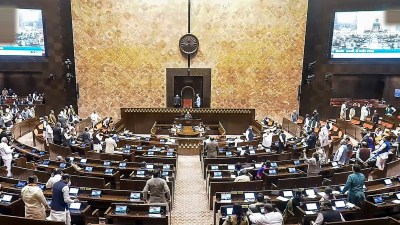The Bombay High Court on Monday upheld the conviction and life sentence awarded to a security guard, a native of Jammu and Kashmir (J &K), for murdering 25-year-old corporate lawyer Pallavi Purkayastha at her Wadala flat in 2012. The HC, however, dismissed pleas by the Maharashtra government and Purkayastha’s father, seeking enhancement of sentence to death penalty for Sajjad Ahmed Abdul Aziz Mughal alias Sajjad Pathan.
According to the police, on the night of August 8, 2012, Pathan deliberately cut off the power supply to Pallavi Purkayastha’s flat sometime before the murder, following which she had to call electricians to get it restored, allowing him to enter her house and kill her.
On August 10 of that year—an evening after Purkayastha’s body was found—police arrested Pathan from the Mumbai Central station, before he was to catch a train to Surat and later flee to his native place
In July 2014, a sessions court convicted him for offences of murder, assault or criminal force to woman with intent to outrage her modesty and house-trespass in order to commit offence punishable with death under the Indian Penal Code (IPC). The state government and Purkayastha’s father approached the high court, seeking death penalty to Pathan, while the convict challenged the sessions court order.

Mumbai Police’s 19-month hunt to nab convict after he jumped parole
In January 2016, Pathan was granted a month’s parole to meet his ailing mother. He never came back and kept frequently changing his location identity, moving between Mumbai and Kashmir. Mumbai Police narrowed down on his location through a Facebook post he made with his brother, which was linked to his old mobile number that revealed his location near Uri in Jammu and Kashmir, a town near the Line of Control (LoC).
However, he moved further to his village Salamabad, which was closer to the Pakistan border and stayed there by changing his looks and working as a labourer. However, poor wages made him move to Delhi and later to Mumbai as a security guard at an under-construction building. As one of his friends alerted the police, he went back to Kashmir via Delhi.
The police did not arrest him immediately as he had told the locals that he was falsely implicated and had gained their sympathy. The police team, disguising themselves as engineers and using locals as sources, closely monitored him. They eventually lured him to the Kargil-Sonmarg area for work, where he was apprehended on October 10, 2017, and brought back to Mumbai amid challenging security and terrain conditions—nearly 19 months after he went missing.
Contentions before Bombay High Court
On November 10, the high court passed its verdict on the pleas—nearly 10 years after they were filed before it.
Story continues below this ad
Advocate Yug Mohit Chaudhry, representing Pathan, argued the case was “purely based on circumstantial evidence,” alleging the prosecution failed to gather the best evidence. He emphasized the absence of Pathan’s fingerprints, calling it “highly unnatural.” Chaudhry also questioned why CCTV cameras were non-functional, despite the society being upmarket and well-secured, suggesting it was unlikely they were not working as claimed by the prosecution, thus undermining the case against Pathan. Chaudhry sought quashing of the sessions court order.
Special Public Prosecutor Manoj Mohite countered claims by Pathan’s defense and said DNA analysis confirmed Pathan’s involvement. His DNA was found on hair at the crime scene, while the knife used in the murder and several other recovered items bore Pallavi’s DNA. Mohite argued that non-functional CCTV cameras did not affect the case’s strength and was not at all suspicious.
Pallavi’s father, retired IAS officer Atanu Purkayastha—in a revision application argued through advocate Abhishek Yende—sought a death sentence for Pathan, arguing his unexplained bloodstains, injuries, and confessions proved guilt. He cited Pathan’s parole jump and him later being traced near the Pakistan border,
HC findings to conclude Pathan’s guilt established “beyond reasonable doubt”
A bench of Justices Ajey S Gadkari and Neela K Gokhale in their verdict observed that the motive behind Pathan committing offence was “sufficiently established” and same “assumed great significance in establishing his culpability.”
Story continues below this ad
Justice Gokhale, who authored a 79-page verdict for the bench, further observed, “There is no material on record to indicate the entry of another person other than Pathan after 1.30am in Pallavi’s flat. The prosecution’s case against Sajjad, based on the last seen theory is thus,established. There is a complete link in the chain of circumstances, which prove his guilt beyond reasonable doubt.” The HC said police had no motive to falsely implicate Pathan.
The bench further noted that it was not a lapse by police that housing society’s internal CCTV cameras were not in working condition and there was “no purpose in collecting the cameras when there was no footage available.”
“Sajjad is the last person seen outside Pallavi’s flat with clear intent in entering it. The following morning, Pallavi is found dead; there is a pool of blood in the flat, outside the flat, near the lift. Sajjad is nowhere to be seen when he was supposed to be on duty. Sajjad calls up two witnesses and confesses his guilt while seeking monetary help to return to his native land…” the HC observed.
The court—referring to the chain of evidence and events—concluded that “in all human probability, the act of murder of the deceased was done by Pathan.”
Story continues below this ad
Imprisonment till end of life, no parole or furlough
The HC highlighted conduct of the convict “who on previous occasion absconded and was returned to prison after a period of one-and-a-half years from near the Pakistan border.”
Therefore, taking a strict stand “in the interest of justice,” the HC sentenced Pathan to imprisonment till the end of his natural life and clarified that “he will not be entitled to the grant of parole or furlough.”









